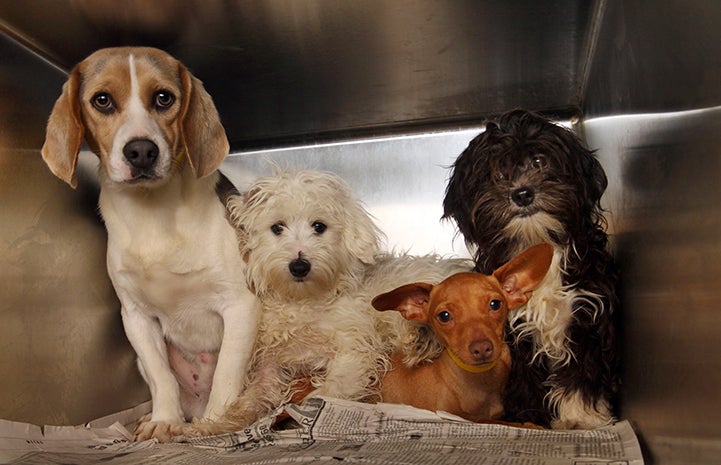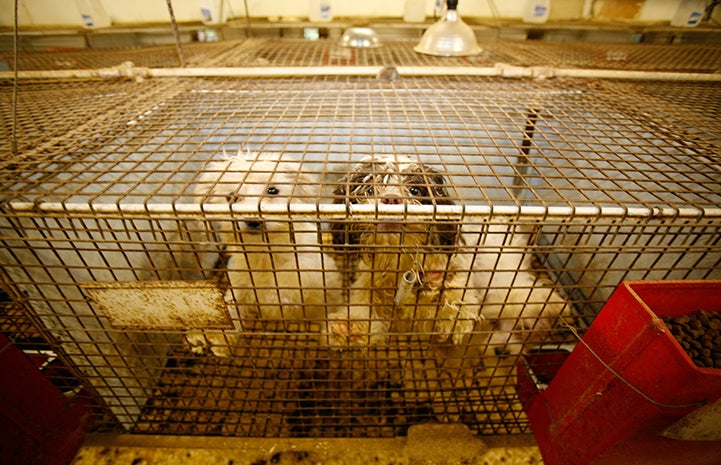Puppies for sale

It may seem like an easy and practical way to buy a dog: You visit a pet store or website, find the perfect puppy, and within minutes you’ve got your new best friend. But just because it’s easy doesn’t mean it’s a good idea. That’s because most puppies for sale in pet stores and online are born and raised in factory-like, inhumane settings called puppy mills, where people see animals as a cash commodity rather than the way you do — as a valued animal deserving of a home that fosters health and well-being.
Puppy mills turn back the clock on community no-kill initiatives, as well as the work Best Friends and our partner organizations are doing to ensure that all homeless pets find a forever home. It is estimated that there are about 10,000 puppy mills in operation in the U.S. today, and the more dogs bought from pet stores with puppies, the less homes there are to adopt from shelters.
What is a puppy mill?
A puppy mill is a commercial dog breeding operation that values profit and maximum production over the health and welfare of the animals. Most of the estimated 10,000 licensed and unlicensed puppy mills in the U.S., are concentrated in the Midwest. In fact, an estimated two million puppies are born each year in licensed and unlicensed puppy mills combined.
So why do we continue to manufacture dogs in mills when at the same time, so many dogs are being destroyed every day because they can’t find homes? The answer, of course, is profit. And those who typically make the largest profit are the retailers who buy puppies for sale at a low cost and then resell them after a high markup.
Get the facts about puppy mills
Puppies for adoption vs. dogs for sale
More than 9,000 healthy and adoptable dogs and cats are killed in animal shelters across the country each day. A solution to this problem is also simple: Adopt rather than buy your next pet.
Because puppy mill pets are raised in deplorable conditions with little human interaction, they run the risk of having significant behavioral issues that may not be apparent to the buyer until the new pet is brought home. In addition, puppies for sale from mills have a high chance of suffering from physical health issues due to malnourishment and poor or even no health care.
Unlike pets for adoption, puppy mill pets are often sold online or shipped to pet stores, where unsuspecting buyers are not informed of the conditions under which they were bred. This can cause heartache and expense for those who purchased them with the mistaken belief that they were buying a healthy pet from the best possible source. So, this is not just an animal welfare issue. It’s a consumer protection issue, too.
Pet store cover-up: Different names for puppy mills
Common alternative names for puppy mills include pet mills, commercial breeding facilities, commercial dog breeder, backyard breeders or factory farms. But the fact is that no puppy mill will advertise the reality of its business. Instead, puppy mills attempt to pass themselves off as reputable, caring and responsible breeders. Because puppy mill laws vary from state to state and city to city, it’s important to check state and local legislation to learn what laws regulate breeders in your area.
Pet stores that sell dogs from puppy mills don’t usually disclose the origins of the dogs, but instead use marketing jargon like “USDA-licensed” or “raised by a professional breeder.” Here’s an important thing to remember: The Federal Animal Welfare Act does not consider humane standards for animals’ quality of life. For example, it is legal and common practice to keep dogs in small cages for their entire lives.

Beware of pet stores that sell puppies (and websites, too)
Make no mistake. Almost every commercially bred dog for sale at a pet store has come from a puppy mill. And now, pet stores have a tough competitor: the internet.
All you have to do is Google “puppies for sale near me” and you can see that buying dogs online and selling dogs online is a new phenomenon. And despite the obvious risks that come with purchasing anything on the web — let alone a living, sentient being — there is no denying that we’ve evolved into a point-and-click culture.
Unscrupulous puppy sellers exploit the opportunity to hide behind attractive websites and slick catalogs that feature stock photos of adorable puppies frolicking in fields or napping in wicker baskets. Consumers who receive puppies shipped to them never see the true conditions of the breeding facilities they came from. They also have no way of knowing whether the puppy they purchase will be healthy or anything like what they thought they were buying, thus elevating the risk of consumer fraud. It’s a game of retail Russian roulette, in which the odds favor the seller.
History of puppy mills
The first puppy mills, opened by Midwest farmers in the post-World War II era, were an attempt to recover from widespread crop failure. Backed by the USDA as an easy and quick way to earn money, farmers turned their attention away from their fields and instead began loading dogs into chicken coops and selling them to retail outlets with pet departments.
As the demand for purebred dogs grew, puppy mills began to grow larger. And just like it is today, the puppy mill dogs of the 1940s were housed in crates, exposed to the elements and left with almost no human interaction or veterinary care. And unfortunately the Animal Welfare Act that went into effect August 24, 1966, did little to change history for the better.

Dog breeders: Can they be trusted?
Best Friends is committed to saving homeless pets. And until our mission has been achieved and every pet has a loving home, we urge everyone to adopt their next pet from a shelter or rescue organization.
Best Friends understands and recognizes that there are responsible puppy breeders who adhere to high standards of care for their animals. However, many commercial dog breeders who are breeding dogs to sell wholesale to pet stores and distributors follow only the minimum required USDA standards of care, which do nothing to protect dogs and to promote responsible, quality breeding.
The fact is that a responsible breeder would never sell to a pet store. This is a basic tenet in every reputable breeder’s code of ethics, including those of the parent breed clubs of the American Kennel Club (AKC). And even if breeders were inclined to sell AKC dogs to pet stores, the high cost of breeding responsibly means that a pet store could never afford to buy AKC puppies from a reputable breeder, because the profit margin would be significantly less than it is when they buy from mills or brokers.
Best Friends’ position on dog breeding
Purebred dogs vs. mutts or mixed breeds
A common misperception is that the only way to welcome a purebred puppy into your home is by purchasing from a dog breeder or pet store. Best Friends urges people looking for a particular breed to adopt from an organization that rescues and finds homes for specific purebreds.
The biggest difference between a purebred puppy and mixed breed puppy or mutt is that purebreds born to parents and have ancestors from the same breed. Puppy mills, which often are a source for purebred animals, capitalize on the popularity of purebreds to make a profit. Consequently, purebreds from puppy mills and non-reputable breeders often have behavioral and physical health issues and many end up abandoned at shelters.
Adopting a purebred dog
If you have your heart set on purebred dog, Best Friends encourages you to:
- Research and adopt a purebred from a rescue organization that specializes in a particular breed.
- Adopt a purebred dog from a local animal shelter or rescue group. Contrary to popular belief, finding purebred dogs at shelters is not uncommon. You have about a 25 percent chance of finding one at your local shelter.
- Learn about the behavior and health issues associated with your desired breed and be committed to fostering their health and happiness, regardless of the possible challenges.
Most adoptable dogs in shelters are of mixed breeds (a combination of different breeds). As advocates of adoption, Best Friends encourages people to adopt the dog whose personality best fits in with the family, rather than choosing a dog solely on breed. Your next best friend could be a purebred — or a one-of a kind mixed breed dog.
How to find the best dog for you
Designer dog breeds
Purebred animals are already at risk for many health issues due to inbreeding and poor conditions at puppy mills. But perhaps one of the biggest consumer fraud issues is the designer dog, created when breeders cross two purebred dogs and give the resulting mixed breed puppies a cute name.
Designer dog breeds like “puggles,” “schnoodles” and cockapoos not only come with just as many health concerns as other puppies from mills, but they’re the most expensive mixed breed dogs available. Designer dogs can have high risks of genetic diseases and other problems because people tend breed them for cuteness over health. Unfortunately, the public’s obsession with designer breeds and a desire for the newest one has led to puppy mills coming up with different mixes that are given a fun name and marketed to new audiences.
If your heart is set on a designer dog, the good news is that shelters are full of designer dog breeds because designer dogs are mixed breeds. It’s just that the designer dogs at the shelter might not be labeled that way.
Puppy mill facts: Health problems and genetic issues associated with dogs from mills
Dogs from puppy mills often suffer from a variety of health problems and genetic issues caused by poor living conditions and inbreeding. Tragically, when the cost of caring for a sick puppy becomes more than the buyer can manage, it is not uncommon for that puppy to be surrendered to an overcrowded, taxpayer-subsidized shelter.
Some of the most common health conditions that affect dogs from puppy mills include:
- Heart disease
- Kidney disease
- Musculoskeletal disorders
- Deafness
- Respiratory disorders
- Endocrine disorders including diabetes and hyperthyroidism
- Vision and eye problems
Other diseases and health problems can include:
- Parvovirus
- Distemper
- Kennel cough
- Pneumonia
- Mange
- Fleas and ticks
- Intestinal parasites
- Heartworm
- Bowel disease
More sad facts: Behavioral issues associated with dogs from mills
Puppy mill dogs spend most of their lives in fear and without any interaction with humans or other animals. In fact, the first months of a dog’s life are a critical time for behavior and personality development. But because puppies in mills are taken from their mothers at six weeks old, they are denied the necessary maternal interaction they need in order to feel safe and secure in the world.
Dr. Frank McMillan, DVM, who is director of well-being studies at Best Friends, has found that puppy mill dogs are born and raised into extremely stressful environments. In fact, they endure so much stress that their psychological functioning is severely impaired. They have difficulty interacting with people, make limited eye contact, have poor attention spans, and can have trouble socializing with other dogs. Those challenges can plague dogs for their entire lives.
Read Dr. McMillan’s resource guide on puppy mill dogs
Puppy mill laws and legislation
Best Friends is helping residents in cities throughout the U.S. put an end to puppy mills by helping them pass ordinances that ban commercially bred puppies for sale in pet stores.
By cutting off the supply of milled puppies being imported into the community, people across the country are addressing the puppy mill problem from the retail end, while increasing adoption opportunities for pets in local shelters.
At Best Friends, we emphasize the importance of adopting pets over buying them and are working to create a cultural shift in the way we think about companion animals and how we choose to bring them into our homes.
Adoption is becoming much more common as legislators recognize the need to pass better regulations for dog breeders and retailers. And there is more awareness than ever about the harsh realities of puppy mills. As people share their knowledge and take action in their own communities, we are steadily moving the needle in a more compassionate direction.
Solving the problem
We’ve made a lot of progress in the fight against puppy mills, but we still have more work to do as puppies are continually mass-produced in a manner that most animal-loving, compassionate people find unacceptable.
The solution to the problem is simple: Stop buying what the mills are producing from the pet retailers selling commercially bred puppies, because any money spent in those these stores or on these websites only keeps the perpetual cycle of puppy mill cruelty going.
When it’s time add a new pet to your household, look for the humane solution while you’re searching. Find pet stores that offer animals for adoption. These stories relieve the burden on shelters and rescue groups by showcasing homeless pets into retail settings, where they have a greater chance of being seen by the public.
What it comes down to is this: The puppy mill problem belongs to all of us, and so does the solution. The ability to put this cruel industry in the past is in our collective hands. We have the power to set positive examples through our consumer decisions.
We have the power to teach compassion for animals to our kids and each other. We have the power to create changes for the better. We have the power to save lives. Working together, we can reach a time when puppies will no longer be mass-produced, when adoption will be the first choice for those looking to bring a pet into the family, and when there will be no more homeless pets. We’re on the right track. We can save them all. After all, every dog deserves a wonderful life.
Learn more about the no-kill movement for pets

This article is based on the original article “Puppy Mills: Tough Life For Dogs.”
Photos by Best Friends staff



